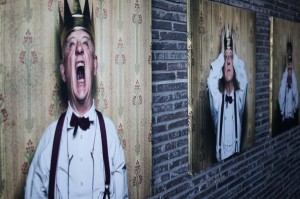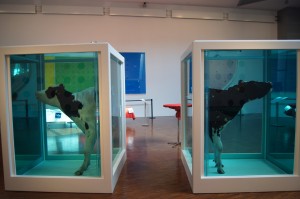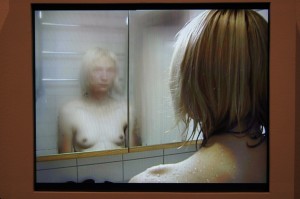|
|
excerpts
2013.07.25. A witness to my life
There is a theatre performance where no-one is getting to know the story of Hamlet. Even Horatio is instructed by the main character to remain silent. In the very last moment of the very last act Hamlet raises his forefinger to his lips. Horatio is staring at him, bewildered, and then slightly, almost unperceivably, he nods in agreement. In the last few hours he almost got drowned by his childhood lad, sent away and then called back, took part in the dangerous mouse-trap intermezzo, wrung his cap as it gets wet, put it back onto his head, played the cello, left the stage and reappeared tiptoe or in a rush whenever said.
In this performance the story of Hamlet is not to be told. But this has no relevance: Horatio is still there. A hushed totem-pot, a perplexed bystander, a flesh-and-blood corpus delicti of all what Hamlet had to go through. Horatio is still standing on the right side of the proscenium with a mixture of devotion and blankness on his face. He irritates me.
There are plenty of reasons why I have always been baffled by Horatio’s persona. But now that I had to work with his character, I became even more disturbed. And then I realize that my angst raises from jealousy. Because Hamlet has got a witness to his life – and this is the part of the role of Horatio that is totally unacceptable for me. I have embarked on the adventure of becoming a migrant fifteen years ago and broke my storyline with new sites, scenes and a totally new cast. I have no Horatio. Not even the faintest possibility to get one. No witness to my life.
My story takes place exclusively in my head. Parts of the puzzle are thrown occasionally here and there, given to one or another persona from the character list, scattered on the map, more or less gravitating around the gist, never meeting each other in most of the cases. The puzzle can be put together and read and interpreted in as many ways as I arbitrarily suit the parts, find some interferences or similarities. I can lie to anyone. I can lie to my mother, who raised me for 18 years and sent me from the Town I Was Born to the City I Studied. I can lie to my father who is good at numbers and calculating possibilities and endless series, so very probably would not bother himself with wondering on the percentage of truth of what I am saying. I can lie to my husband who has seen only once in his life, not long ago, the City I Studied and could not believe that this architecture, this site, this language, these foods were once my home – and what is more: as time passes by I become more and more obsessively absorbed by them. Whatever we call this: homesickness or phantasy or metaphysics – or: mental disorientation – there are still plenty of places and faces and facts that I am empowered to take advantage of and lie to a big bunch of people, simply because I passed a border in my life. Once, up till now. And at the moment I am right on the track to do it once again. So mind my words. None of you would ever be able to catch me. And, do you think that if I could lie to my closest circle, would I pardon anybody else?
But lying is good. Lying is fine. Lying is a great way of telling the truth. And, as I am in lack of Horatio, I am the only one who can tell you the next chapter, next act, next scene or move of my story. The story of a migrant. A liar. A crown witness to her own life.
By the way, the performance above, the very unique Hamlet and the very special Horatio above are all part of a theatre company I am in love with. This affirmation – and my affinity – does not refer to any particular member of that company, does not refer exclusively to the members who were there around seventeen years ago when I started working with them ‘back’ in Romania, and does not exclude the members who have arrived meanwhile those – sometimes really long – years we have not been working together. If a meticulous researcher put some wires around my skull to seize my brainwaves, he would probably find a burst of activity when I think of them. When I think of them all. The meticulous researcher would be amazed to find my love somewhere on the no man’s land between the romantic ardour and the love of settled marriage. And would be also amazed that it cannot be narrowed down to any particular person. We have to admit it: this is a really soothing feature of metaphors.

2013.08.08. All the papers
Frozen in the immigration office, with all the papers in my hand.
Unintelligible questions on the twinkling voice of Six-year-old and repetitive glances of Husband, cast on my trembling hands. But Sy and Hu cannot get close to me at the moment. Sy and Hu have sailed away from me, as they often do whenever I am absorbed by the tunnel of my past experiences: a tunnel that would always let me and only me in. That tunnel.
Monsters and shades. Real and imagined ones. Taking the shape of merciless old shrews and mocking youngsters. Flight attendants and occasional workmates. Even family members. All agreed in one certain point: I do not belong here. My persecutors for long, painful seconds.
So: frozen in the waiting room of the immigration office, with all the papers in my hand. For an instant, I guess, seen from outside.
And then fast recover and reboot as usual: techniques and breathes and thoughts to get me back to this seat, to the meaningful words, to the palpable surrounding ready to hold me to its breast as soon as I am mature enough to not let the memories invade me. Memories of an Outsider, a Different, an Other. Memories of a Romanian backpacker arriving to Hungary fifteen years ago.
Actually, not too many people in the waiting room. Two men and a young girl apart from the three of us. They are looking suspiciously at us. They talk about us. They do not like us. They are irritated by us. We seem too high-class, too well-treated, too well-received compared to them, poor immigrants. Out of a reflex, I translate their dialogue to Hu. Out of a reflex, he listens carefully. I go on. Up till we realise that first: this is not something we are supposed to understand and second: surprisingly, I still do understand what they say.
Romanians, immigrants from my homeland. Arriving here with a backpack and hopes. Having no-one to help them. Getting into an utterly new world. Being scared of what would be coming. Hoping to get some new chance in this new place. Hoping to make their best move. Feeling different from us. Papers in their hands.
I sit down next to the girl. She scowls. The older man tells her to move if she cannot bear my closeness. His voice is calming. It comforts her and it comforts me.

2013.11.09. The way I am
Winter boots, comfortable dressing, almost trekking-equipment today when approaching the Danish language school I am entitled to attend free of charge for three years, in a very fast pace: 9 hours a week for a month, and then it rises to 15 hours. Morning classes for expats’ spouses and evening classes for those who work.
Winter boots and trekking-equipment today is result of direct logical deduction from yesterday`s first experience when I thought I would simply take a nice walk from my daughter’s school to get to the language centre and sit down elegantly and charming across the headmaster who will be enchanted to get to know an open-minded Eastern-European intellectual bringing the spicy odour of her cultural roots into the Scandinavian world.
My imagined entree underwent a slight but significant change as yesterday I ended up running up and down some inexistent Danish hills – yet now boldly rising against me; I even rushed out of city limits into a loft where actually the school resides. Late and swimming in sweat – to introduce you a very creatively hidden synesthetic Hungarian expression. I was treated nicely and empathetically, being explained what and how and where and when is going to happen. Right from the very next day. (And if you were attentive enough, you know: that is today.)
So this morning I did a careful research to find the best bus up and down the hills and out of the city limits to the loft where nice teachers are going to introduce me to mystically pronounced Danish language. The bus takes me outskirts (fine). There are lofts and industrial plants (fine). And then there is meadow (NO!) and passengers have all disappeared (I don´t care, at least I can swear). So I suddenly jump down the bus in the middle of the meadow right 2 or 3 kilometres after the last industrial plant has weaved away from my sight. At least this time I have my great trekking-equipment.
Run, sweat, late, later, the latest (and the last) – and then suddenly the most beautiful high-end neighbourhood of villas with their names on the forefront, large gardens and well-situated people walking around. This road crossing the My Fair Lady- neighbourhood gently leads me down to the Kulturhaven: about 6 kilometres away from the language school. While the computer boots in (7 minutes) I take my time to swear again and cry so as the receptionist doesn`t dare to pose me any question and this way allows me to preserve the eternal dignity of life-tortured mad women. In my letter to the headmaster I mention that I am a lost Eastern-European woman not able to take up with the challenge of their welfare society and thus cannot find my way to school – and she is welcomed to regard this metaphorically, as well. In the very last moment I delete the paragraph that says that I prefer being shot in the head rather than going through this fucked up life I have had to bear in the last 41 years.
My husband, who was included into the 2-member mailing list of my dramatic essay, immediately sends me a letter whether I need some mediation with the school. He says he could offer me a helping hand meanwhile I write down this story right here in the lobby of the Kulturhaven, with my trekking equipment and the gaze of scared receptionist stabbing my back. But I need no mediation. They have to love me the way I am. Just love me. The way I am.

2014.01.30. Silence
If you say “milk” in Romanian, there is no problem, but if you say “bread”, people will immediately notice that you are a Hungarian minority and god knows what reaction could come – this was my first experience with languages when as an elementary schoolgirl I was sent to the shop by my mother and from her first movement to stretch me out the shopping bag, thunderstorms escalated in my heart up till the moment when it turned out what I had to buy.
Most of the times nothing frustrating happened to me: I was not laughed at loudly by huge open mouths revealing thick tongues and carious dentils. Nor put on chain, hit by whip and tortured like a mad dog. Not even an eyebrow was raised – most of the times.
Still, being thrown out in the unknown and sometimes very hectically dangerous world of sometimes very differently reacting people – that was the most frightening experience that could ever come in the happy-relaxed afternoons of my well behaved, good girl, eminent student childhood.
Things in my head escalated into a script according to which bread was the corpus delicti to give out my otherness. As with bread I might have lost my dignity and trust in people surrounding me. With bread I had to rely on goodwill of others – unknown and from one certain respect definitely different people: the caste of those who can pronounce “bread” correctly.
When I walked down the stairs of our first-floor apartment to the shop, I took with me the burden of the worst outcome ever: the possibility of being excluded.
Statistically, I guess, I was not excluded from more playgroups, playgrounds, schools, universities, workplaces and editorials than any other human being in this world. But I always blamed the bread. The “bread”.
If I wished – and I wished very often – to live in a place where words do not come aggressively between me and the world perceived, than this desire has now come true. I am in the middle of a transitional period right before sentences heard in the street get intelligible for me. Melody of Danish words sneaks into my ear very pleasantly and I just let them flow without any eagerness to catch their meaning. If I want I switch to English. If I want I refuse words. And choose the silence. The silence.
|



